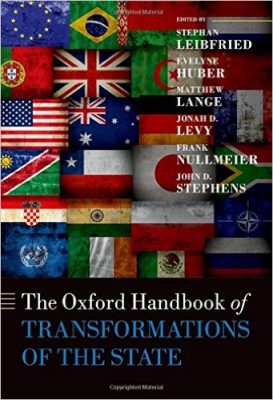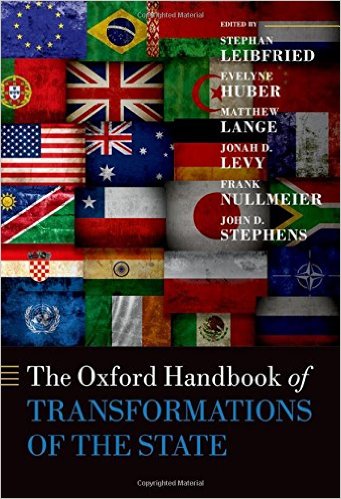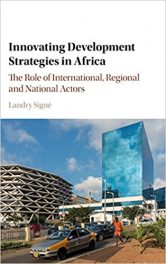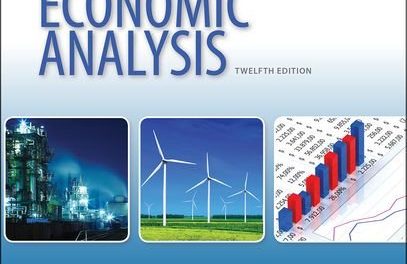 Editors: Stephan Leibfried, Evelyne Huber, Matthew Lange, Jonah D. Levy, Frank Nullmeier, and John D. Stephens
Editors: Stephan Leibfried, Evelyne Huber, Matthew Lange, Jonah D. Levy, Frank Nullmeier, and John D. Stephens
Publisher: Oxford University Press – 898 pages
Book Review by: Sonu Chandiram
For several decades now, political scientists have been observing and writing about how countries have been forming groups for mutual benefit. Some examples of these are the Organization for Economic Cooperation and Development (OECD), the Organization of African Union (OAU), and the Association of Southeast Asian States (ASEAN).
While the organizations named above promote more or less informal relationships without any binding rules, the structure of European Union or EU is different, wherein member nations are bound by certain rules, including perhaps most important, using a common regional currency, the Euro. Like many types of organizations, there are not only membership benefits, but drawbacks as well. This is because of the different characteristics of member states.
The contributors to this book take a look from regional and international perspectives, at how nations have changed and even evolved politically in relation to one another. They examine, in the chapters, among other phenomena, how countries have had a variety of similar or different political experiences.
This book is a product of the University of Bremen’s Transformations of the State Collaborative Research Center, the German Research Center, and the University of North Carolina, Chapel Hill’s Center for European Studies (CES), and European Union Center for Excellence (EUCE).
Fifty-nine people, including the six editors named above, who are specialists in various aspects of international relations, contributed to the content of this volume. They are mainly people from Germany and the United States, but also from eight other countries – Argentina, Canada, Hong Kong, Italy, Ireland, Netherlands, Spain, and the United Kingdom.
They authored or coauthored the 44 chapters of this large book of nearly 900 pages. The chapters are organized into six broad Parts, entitled:
- The Emergence of Modern States
- Internationalization and the State
- Crucial Types
- Crucial Issues
III. Contemporary Transformations of the Core OECD World of States
- Crucial Types
- Crucial Issues
- Post-Communist Peculiarities? State Transformations in the Former Communist World
- Crucial Types
- Crucial Issues
- State Transformations in the Non-OECD World
- Conclusion
Among the topics discussed in this book are the following:
- Pathways and patterns of modern nation-state building
- Emergence of new world states
- State formation and transformation in Asia and Africa
- State theory and four analytical traditions
- Limited statehood and its characteristics
- Internationalization and how it has affected states adversely and beneficially
- Sovereign equality and inequality
- Multilevel governance
- Transnational regulatory institutions and how they are impacting nationals
- Security, intervention, and protection responsibility among member states
- The 2007-08 International Financial Crisis and changing economic roles of states
- Global environmental risks and responsibilities of states
- State transformations among affluent states
- Transformations of the statist model
- From industrial corporation to the social investment state
- Changing roles of states in liberal market economies
- Welfare state transformation: convergence and the rise of the supply-side model
- Migration and the porous boundaries of democratic states
- Peculiarities of post-Communist state development: institutional consolidation
- Transformation of the state in Eastern Europe
- Resources as constraints? Natural resource wealth and the possibility of developmental states in the former Soviet Union
- Transformation of the Russian State
- China: economic liberalization, adaptive informal institutions, and party-state resilience
- Predatory states and state transformation
- State failure and state transformation
- Democracy and regime change in the global south: causes and trends
- Emerging welfare states in Latin America and South Asia
The editors conclude: “states remain the central actor to any system of governance, as both sub-national and international actors need to work with and through states. And as organizations that focus on solving problems, states will continue to adapt to this changing environment, and their importance will not diminish.”
It is important to note that the editors point out that advanced capitalist have numerous advantages over others to adapt successfully to whatever challenges they face in the future, The populations of these countries have higher levels education health, education, income, and longevity, and lower levels of crime. These countries are also more politically stable.
This is an excellent, high authoritative, and extensive volume on states and how they have transformed and evolved in various ways throughout modern history.
Editors:
Stephan Leibfried is Research Professor at the University of Bremen and Jacobs University Bremen. He was Director of the Collaborative Research Center Transformations of the State (TranState 2003-2014) at the University of Bremen, an interdisciplinary center financed by the German Research Foundation.
Evelyne Huber is Moreland ALUMNI Distinguished Professor of Political Science and Chair of the Department of Political Science at the University of North Carolina in Chapel Hill.
Matthew Lange is Associate Professor of Sociology at McGill University in Montreal, Canada.
Jonah D. Levy is Associate Professor of Political Science at the University of California, Berkeley.
Frank Nullmeier is Professor of Political Science at the University of Bremen and Head of the Research Unit “Theory and Constitution of the Welfare State” at the Center for Social Policy Research (CES) at the University of Bremen.
John D. Stephens is Gerard E. Lenski Jr. Distinguished Professor of Political Science and Sociology, and Director of the Center for European Studies and the European Union Center of Excellence at the University of North Carolina in Chapel Hill.







